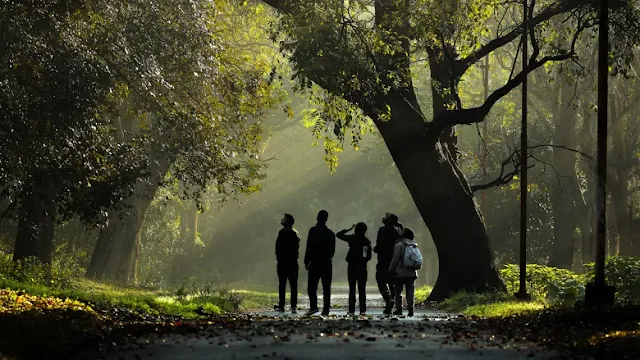In recent decades, the world has witnessed an alarming deterioration in our relationship with nature. As our societies have advanced technologically and economically, the consequences of our actions on the environment have become increasingly evident. Climate change, loss of biodiversity, deforestation, and pollution are just a few examples of the destructive impact of human activities.
 |
| Source: WWF-UK |
To ensure a sustainable and prosperous future, it is crucial to acknowledge and address the current state of our relationship with nature. In this blog, we will explore the reasons behind this deterioration, its consequences, and present a compelling argument for the urgent need to improve our connection with the natural world.
Section 1: Understanding The Deterioration
- Historical Perspective: To comprehend the current state of our relationship with nature, it is essential to examine its historical context. Throughout much of human history, indigenous cultures maintained a harmonious relationship with the natural world, recognizing the interconnectedness of all living beings. However, with the advent of industrialization and exponential population growth, humanity's perception of nature underwent a dramatic shift. This shift towards exploitation and domination has resulted in the devastating consequences we face today.
- Factors Contributing to the Deterioration: Several factors have played a significant role in the deterioration of our relationship with nature.
- Consumerism and Materialism: The relentless pursuit of economic growth and material possessions has led to excessive consumption, habitat destruction, and resource depletion.
- Technological Advancement: While technology has brought numerous benefits, it has also disconnected us from nature. Our reliance on artificial environments and digital experiences has distanced us from the natural world.
- Disconnect from Food Production: Modern agricultural practices, such as factory farming and monoculture, have diminished our understanding of the intricate relationship between food production and nature.
- Urbanization: Rapid urbanization has led to the detachment from natural surroundings, as most people now live in concrete jungles, devoid of green spaces.
Section 2: Consequences of Deteriorating Relationship
- Climate Change: The consequences of climate change, primarily caused by human activities, are wide-ranging and severe. Rising temperatures, extreme weather events, melting glaciers, and rising sea levels are just a few examples of the impact on our ecosystems, biodiversity, and human livelihoods.
- Loss of Biodiversity: Human activities such as deforestation, habitat destruction, and pollution have accelerated the loss of biodiversity at an unprecedented rate. The extinction of species disrupts ecosystems, affecting natural balance and potentially causing irreparable damage.
- Environmental Degradation: Pollution, including air, water, and soil pollution, has far-reaching consequences for both nature and human health. The degradation of ecosystems, water scarcity, and the proliferation of waste are alarming symptoms of our deteriorating relationship with the environment.
Section 3: Need for Improvement
- Emotional and Psychological Well-being: Reconnecting with nature has a deeply profound impact on our emotional and psychological well-being. Numerous studies have shown that spending time in nature reduces stress, depression, and anxiety while increasing a sense of belonging and connection.
- Health Benefits: Engaging with nature through activities like hiking, gardening, and simply spending time outdoors has proven health benefits. Exposure to natural environments promotes physical activity, improves cardiovascular health, and boosts the immune system.
- Preservation of Ecosystem Services: Ecosystem services, such as clean air and water, pollination, and nutrient cycling, are fundamental to our survival. By improving our relationship with nature, we protect these services and ensure the long-term sustainability of our planet.
- Climate Change Mitigation: Reversing the deterioration of our relationship with nature is critical for mitigating climate change. Natural solutions, such as reforestation, ecosystem restoration, and sustainable land management, have the potential to sequester carbon and reduce greenhouse gas emissions.
Section 4: Steps Towards Improvement
- Education and Awareness: Education plays a crucial role in fostering a deeper connection with nature. Working with schools, communities, and organizations to promote environmental literacy and awareness can instill a sense of responsibility toward the natural world.
- Sustainable Practices:Promoting sustainable practices, such as reducing waste, conserving energy, and embracing renewable resources, is essential for creating a more harmonious relationship with nature. Individuals, businesses, and governments must collaborate to implement sustainable policies and practices.
- Conservation and Restoration: Efforts to conserve and restore ecosystems must be prioritized. Protecting natural habitats, implementing effective wildlife conservation measures, and restoring degraded lands are critical steps towards a more sustainable future.
- Green Spaces in Urban Areas: Creating and preserving green spaces in urban areas is vital for reconnecting urban populations with nature. Parks, gardens, and rooftop greenery provide opportunities for people to engage with the natural world, improving their well-being and strengthening the relationship with nature.
Our deteriorating relationship with nature has far-reaching consequences for our planet and future generations. Acknowledging the factors causing this decline and understanding its consequences is the first step towards improvement. By fostering a deeper connection with nature, promoting sustainable practices, and prioritizing conservation and restoration efforts, we can work towards a better tomorrow. It is time we recognize that our well-being, health, and survival ultimately depend on the health of our natural world. Let us strive to restore and strengthen our relationship with nature for the benefit of all living beings on Earth.
